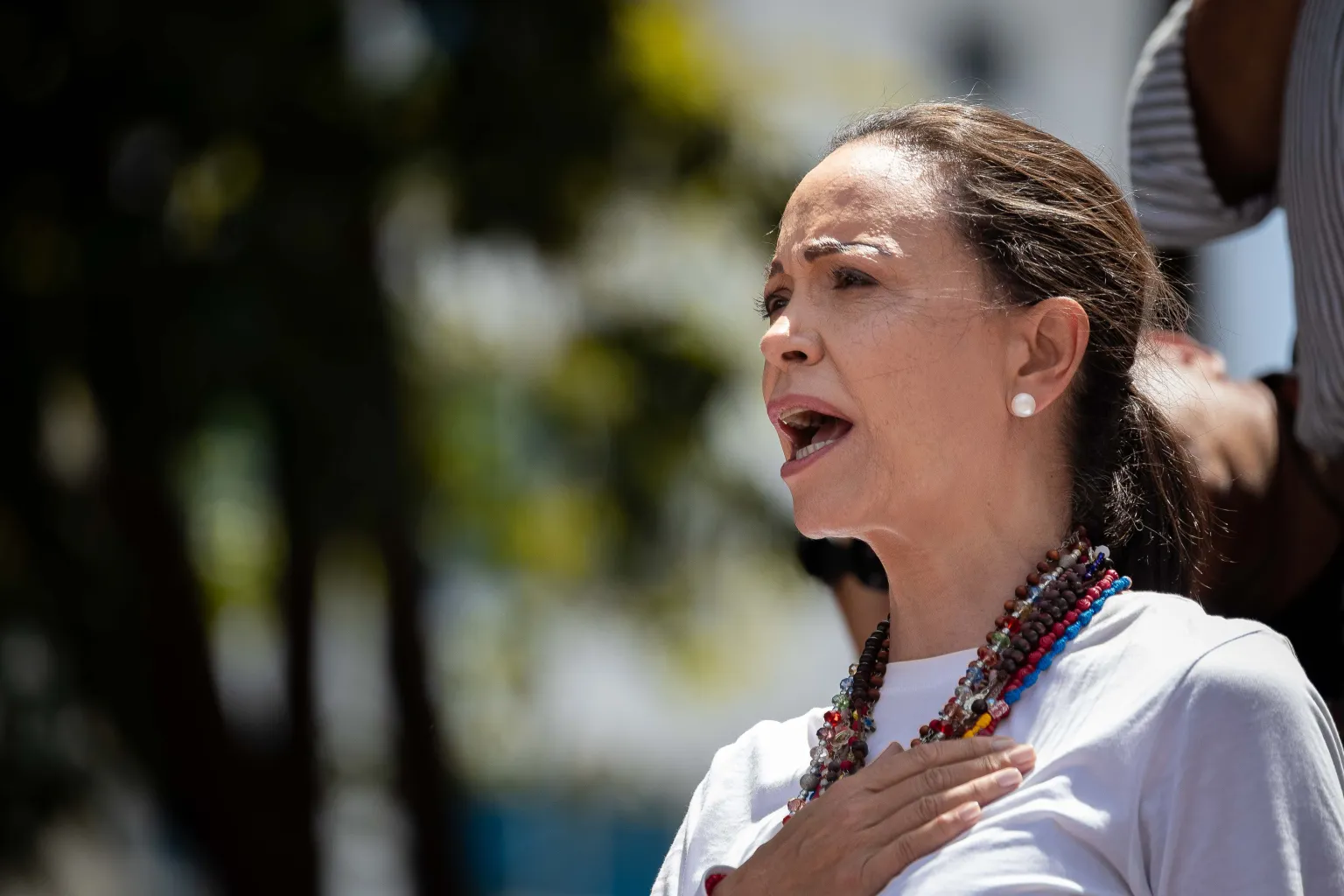International
María Corina Machado: González Urrutia will be sworn in as president in January 2025

The opposition leader of Venezuela María Corina Machado is convinced that Edmundo González Urrutia will take the oath as the new head of state on January 10, 2025, when the new period of government begins, despite the official proclamation of Nicolás Maduro as the winner of the July 28 elections, a triumph questioned inside and outside the country.
In an interview with EFE, the former liberal deputy reiterated that the standard-bearer of the opposition Democratic Unitary Platform (PUD) won “in an overwhelming way” the elections, the official result of which has been rejected by numerous countries, while the Carter Center, which participated as an observer in the contest, pointed out that the electoral process “cannot be considered as democratic.”
“Edmundo González will be the new head of state and the new commander-in-chief of the Armed Forces and that depends on what we all do, all Venezuelans inside and outside the country (…) I trust the people of Venezuela and that’s why I know that on January 10 we will have a new president,” he said.
While it remains under guard due to threats against it, the anti-Chavista reproaches that the National Electoral Council (CNE) has not yet published the disaggregated results of the elections – contrary to its own schedule -, despite the numerous requests for transparency by the international community.
Taking the electoral minutes that the PUD published on a website as true, Machado assuresthat the “whole world knows” that Maduro, in power since 2013, lost the elections and tries to concretize “the greatest fraud in history” by insisting on his victory, with the help of the institutions and the military leadership.
Maduro “today has zero legitimacy, no legitimacy and, therefore, it is a time when the international community has to leave a very clear red line linked to respect for popular sovereignty,” he continued.
He also hopes that foreign governments, “firmly and unequivocally, make Maduro understand that what he is doing is unacceptable, using repressive forces against innocent citizens,” alluding to the balance left by the post-election crisis, with more than 2,400 arrested and 24 deaths, – according to several NGOs – some of them in citizen protests.
The former deputy also predicts that, in the coming days, critical voices against Chavismo will continue to grow because, as she said, it is about applying “all the necessary pressure for Maduro to understand that his best option is to accept the terms of a negotiation,” something that the president has already publicly rejected, since he insists on having won the elections.
International
Bolivia Orders Three Investigations Into Deadly Military Plane Crash

Bolivia’s Defense Minister Marcelo Salinas announced Monday that three separate investigations will be conducted into Friday’s crash of a military cargo aircraft at El Alto International Airport, near La Paz, which left at least 22 people dead.
The Hercules aircraft, operated by the Fuerza Aérea Boliviana (FAB), was transporting cash intended for the Central Bank of Bolivia when it overshot the runway after landing from the city of Santa Cruz. The plane reportedly traveled nearly one kilometer beyond the airport perimeter.
The incident sparked chaotic scenes, with individuals attempting to collect scattered banknotes. Authorities detained 51 people in the aftermath, and the government declared three days of national mourning.
Multiple Investigations Underway
The first inquiry is being led by a military board from the Bolivian Air Force, which has already taken custody of the aircraft’s black box for analysis.
Minister Salinas said two additional investigations will follow — one conducted by the insurance company and another by the aircraft’s manufacturer.
“At least two more investigations will come, that of the insurance company and that of the aircraft manufacturer,” Salinas said during a press conference in Santa Cruz.
He cautioned that the investigative process could take between three and six months, noting that the black box cannot be opened in Bolivia due to the lack of specialized laboratories for analysis.
Awaiting Official Findings
Salinas stressed that the FAB investigative board is the highest authority in the case and urged the public to wait for its conclusions to avoid speculation about the causes of the crash.
He also confirmed that the government has contacted the families of the 22 victims and the 37 injured, as well as the owners of 15 damaged vehicles, to coordinate procedures with the insurer and cover the corresponding expenses.
International
Mexico Calls for Immediate Probe After National Dies in ICE Custody

Mexico’s Secretaría de Relaciones Exteriores (SRE) on Monday called on U.S. authorities to conduct an “immediate and thorough” investigation into the death of a Mexican national while in custody of U.S. Immigration and Customs Enforcement (ICE) at a processing facility in California.
In a statement, the Mexican government described the death as “regrettable” and urged U.S. officials to clarify the circumstances surrounding the case in order to “determine responsibilities and ensure that such events do not happen again.”
Death at Adelanto Processing Center
According to available information, the Mexican citizen died at the Adelanto Processing Center in California while under ICE custody. Authorities have not yet released the individual’s identity or the cause of death.
Following the incident, Mexico’s Foreign Ministry formally requested “detailed information” from U.S. authorities, including the detainee’s medical records and custody reports.
Consular Assistance Activated
The Mexican Consulate in San Bernardino, California, has activated consular assistance protocols to provide ongoing support to the deceased’s family. Officials have contacted relatives to express condolences and offer legal guidance, as well as assistance with the necessary procedures to repatriate the remains.
“The handling of situations like this and the establishment of mechanisms to resolve them are priorities for the Government of Mexico,” the Foreign Ministry said, adding that it will formally request an investigation into any systemic conditions that may have contributed to such incidents.
Local Mexican media reported that seven Mexican nationals died while in ICE detention last year — the highest number recorded since the agency was created.
International
Anti-ICE Billboard Campaign Targets Immigration Spending in 31 U.S. Cities

More than 200 billboards criticizing U.S. Immigration and Customs Enforcement (ICE) began appearing Monday in 31 cities across the United States, including Miami, as part of a campaign highlighting the high cost of immigration enforcement operations for taxpayers.
The initiative, titled “ICE Costs Us,” was launched by the civil rights organization Mijente and will run for four weeks.
Criticism of Spending and Enforcement Tactics
The billboards feature images of ICE agents during arrests or carrying military-style weapons. According to the organization, spending on military-grade equipment for the agency has increased by 600 percent in recent years.
Several signs display messages such as:
“Your taxes are being wasted” and “ICE’s cruelty costs you $28 billion,” referring to the agency’s annual budget.
In a statement, Marisa Franco, co-founder of the Mijente Support Committee, said:
“For too long, our government has prioritized building cages and investing billions in an immigration enforcement apparatus that has left families torn apart and communities terrified.”
She added that “Millions of Americans are living paycheck to paycheck, yet this violent agency continues operating with a blank check. These decisions do not make us safer nor improve our economic security. Our billboards highlight these choices and demand a different path.”
Budget Debate and Medicaid Comparison
The campaign also draws a comparison between ICE’s funding and the estimated 17 million people who could lose health coverage under Medicaid due to federal budget cuts under President Donald Trump.
Other billboard messages seen in various cities include:
“They get billions to beat us; we get layoffs and rising rents” and “Funding ICE is a fast track to fascism.”
Organizers say the goal is to spark public debate about the allocation of federal funds for immigration enforcement and the broader economic and social impact of such policies on communities nationwide.
-

 International4 days ago
International4 days agoCocaine Production Surges 34% in 2023 as Market Expands into Africa and Asia
-

 International3 days ago
International3 days agoTrump Floats “Friendly Takeover” of Cuba Amid Rising Tensions
-

 International2 days ago
International2 days agoIran Reports 201 Dead, 747 Injured After U.S. and Israeli Strikes
-

 Sin categoría3 days ago
Sin categoría3 days agoTrump: ‘We Think It’s True’ Amid Claims Iran’s Supreme Leader Was Killed
-

 International3 days ago
International3 days agoSecurity Council to Hold Emergency Meeting on Middle East Crisis
-

 International4 days ago
International4 days agoFederal Judge Blocks Trump Policy Allowing Deportations to Third Countries
-

 International3 days ago
International3 days agoArgentina’s Senate Reviews Milei-Backed Labor Overhaul
-

 International2 days ago
International2 days agoPope Leo XIV Urges End to ‘Spiral of Violence’ in Middle East
-

 International12 hours ago
International12 hours agoBrazil’s Supreme Court Rejects Bolsonaro’s Bid for House Arrest
-

 International4 days ago
International4 days agoClinton Accuses Republican Committee of Using Epstein Case to Shield Trump
-

 International12 hours ago
International12 hours agoAnti-ICE Billboard Campaign Targets Immigration Spending in 31 U.S. Cities
-

 International12 hours ago
International12 hours agoTrump Warns of ‘Major Wave’ of Attacks as Iran Conflict Escalates
-

 International12 hours ago
International12 hours agoMexico Calls for Immediate Probe After National Dies in ICE Custody
-

 Central America12 hours ago
Central America12 hours agoPanama Canal Monitoring Trade as Middle East Conflict Disrupts Shipping
-

 International12 hours ago
International12 hours agoBolivia Orders Three Investigations Into Deadly Military Plane Crash




























